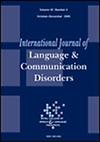Parenting children with developmental language disorder in the days of COVID-19 in Turkey: Expectations and possibilities
Abstract
Background
Owing to the COVID-19 pandemic, speech-language therapists faced challenges in reaching children with developmental language disorders (DLDs) for a certain period. This unexpected change also had a profound impact on parents of children with DLDs. Despite its significance, there is limited research exploring the experiences of parents who were unable to consult with specialists and their perspectives on telepractice services.
Aims
The primary objective of this study is to investigate the experiences of parents with children diagnosed with DLD (n = 5) related to accessing experts during the COVID-19 pandemic.
Methods and Procedures
Prior to the onset of pandemic-related closures, assessments for children with DLDs were conducted, and plans for initiating their therapies were in place. Parents of children who were unable to commence therapy were invited to participate in the study. Interpretative phenomenological analysis principles were employed to analyse the collected data.
Outcomes and Results
The findings are analysed under four themes. Parents initially expressed the negative impact of being unable to reach experts, which led them to independently support their children's language development. Despite reservations about telepractice, parents were willing to participate. However, they reported feeling unprepared for the abrupt transition to telepractice, particularly regarding the technical requirements, which were limited in availability.
Conclusions and Implications
Maintaining communication with parents, particularly during crisis periods, is crucial for children in need of speech and language therapy. Providing parents with information about the therapy process, their child's language disorder, and the potential use of telepractice is essential. This approach ensures that we can offer effective support for the children.
WHAT THIS PAPER ADDS
What is already known on the subject
- During COVID-19, parents of children with developmental language disorders who were undergoing therapy experienced adverse effects. They struggled to assist their children with communication issues and were unable to seek services.
What this paper adds to existing knowledge
- If their children are unable to receive language and speech therapy, parents may attempt to resolve the issue on their own. It is a difficult scenario for both parents and children. To support families in this situation, alternatives ought to be sought.
What are the potential or actual clinical implications of this work?
- It is possible to make improvements to current procedures and carry out research to inform families on what to do when they are left alone with their children. Future telepractice research will benefit from the development of useful tools and insightful investigations.

 求助内容:
求助内容: 应助结果提醒方式:
应助结果提醒方式:


